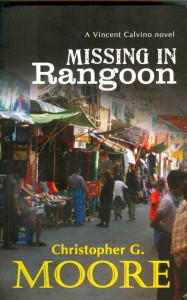 Veteran Bangkok-based novelist Christopher G. Moore’s book, Missing in Rangoon (2013, ISBN 978-616-7503-17-2), is the latest in his detective Vincent Calvino series. We here at WoWasis loved the plot, and the book has passages with some of the best writing we’ve seen from this prolific novelist.
Veteran Bangkok-based novelist Christopher G. Moore’s book, Missing in Rangoon (2013, ISBN 978-616-7503-17-2), is the latest in his detective Vincent Calvino series. We here at WoWasis loved the plot, and the book has passages with some of the best writing we’ve seen from this prolific novelist.
The story is delicious. Calvino gets a missing person’s case that takes him to Myanmar (Burma), drugs are involved, and the plot takes several wonderful twists that keep the reader mesmerized. His counterpart, Colonel Pratt of the Royal Thai Police is along for the ride nominally incognito as a jazz musician. Jazz figures prominently in the story-line. We loved the ending, which underscores the author’s understanding of how life really works in both Burma and Thailand, where the tale eventually resolves.
In our opinion, some of the best writing in the book concerns the labyrinthine Burmese legal system and its courts. On pages 148-156, Moore conducts a tour de force of court proceedings with an eye for detail that’s remarkably descriptive and enchanting. Moore’s own background as a lawyer undoubtedly helps, but one still has to communicate it for the reader. Here’s just a taste:
A calendar was nailed above the half-partition that separated the courtroom from the one next door. There was no clock. One of the guards found a key on a thick ring of keys and unlocked Wai Wan’s handcuffs. He was the first to testify. He walked to a platform and stepped up, facing the judge, but still much lower than where the judge sat. He swore an oath to tell the truth. He swore by placing his hand on a lacquered palm leaf with Buddhist scriptures written in Sanskrit and wrapped in a red cloth. He swore to the Buddha to tell the truth. During the swearing the feathery beating sound of bird wings nearly drowned out Wai Wan’s voice. No one paid any attention to the far wall, where at the top a row of windows with torn wire mesh had become a nesting place for birds. As Wai Wan swore his oath, pigeons fluttered and cooed, flying in and out from the courtyard side.
The ex-hanging judge slipped on his official white hat, a gaung baung, casting him in the role of the good guy in the drama. The junior lawyers and the Crown counsel wore pink versions. The hats were frayed and yellowed around the rim, as if they’d been handed down for generations without ever being laundered.
In terms of honing the book to a sharper edge, we’d like to see a little more refinement in terms of jazz jargon. Jazz has an argot unto itself, not always verbal. A finger pointed to the head means let’s go back to the top, four fingers raised means “trade fours,” in which musicians trade solos over four bars of music, just to cover some non-verbal stuff. In verbal terms, jazz musicians and aficionados don’t refer to the “saxophone,’ as Moore’s characters do, but instead refer to the variety they play in one word only, usually tenor, alto, soprano, or bari (baritone). “Did you bring your tenor?” sums it up. Also, jazzmen playing these instruments refer to the “keys” on their horns, not “buttons” (page 98). A Brooklyn detective and a Thai reedman playing jazz would know this. A baseball reference also needs work: mangers, not coaches, pull pitchers from the game (page 162), something that a hard-boiled Yankee fan-detective from Brooklyn wouldn’t miss. Moore, who spent much of his life in Canada, gets a bit of a hall pass, but Calvino is, after all, his protagonist. And Calvino is a hard-boiled Brooklynite.
We found some of Moore’s similes forced: “the super-fan who’d been super-glued to him before like a bandage on a hairy leg” for one. At times we wish he’d drop the many hard-boiled similes and just let the story and characters run a bit more.
But back to the good stuff, and there’s plenty here. The death scene on pages 310-317 is a wonderfully written amalgam encompassing the Thai and Burmese underworlds, which we won’t quote because we don’t want to divulge the ending. It’s well worth waiting for. It’s Moore at his best, and displays his knowledge of how Southeast Asia really works, in terms of unofficial channels.
As old Asia hands, we enjoyed the book, and especially recommend it for travelers to Thailand that are curious as to what’s going on under the surface. Read Bangkok’s daily English newspapers, and you’ll find references to all sorts of things that are beyond the ken of many westerners. Sometimes, especially with crime reporting, they don’t seem to make much sense. Reading a book like Missing in Rangoon will open up a whole new world of knowledge that will help the reader to understand the element in the story that the newspaper — and reporter — dared not reveal. Buy Missing in Rangoon here at the WoWasis eStore.
[…] “The story is delicious. Calvino gets a missing person’s case that takes him to Myanmar (Burma), drugs are involved, and the plot takes several wonderful twists that keep the reader mesmerized… In our opinion, some of the best writing in the book concerns the labyrinthine Burmese legal system and its courts… with an eye for detail [it’s] remarkably descriptive and enchanting… It’s Moore at his best… Reading a book like Missing in Rangoon will open up a whole new world of knowledge that will help the reader to understand the element in the story that the newspaper — and reporter — dared not reveal.” —WoWasis Travelblog […]